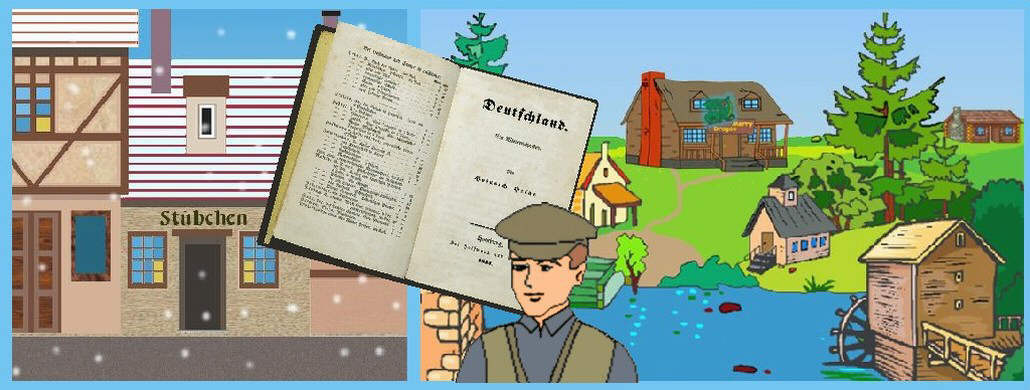
[America, around 1845] Niklas Bergmann received a book that his German relative Jean had smuggled across the border and sent to him. It was Heinrichs Heine’s “Germany. A Winter’s Tale”, banned in Prussia.
One evening at home in the “Merry Dragon” inn, Harvey found his father Niklas all immersed in a book. “What are you reading, father?” he asked, “you look sad.” Niklas looked up. “Oh, Harvey. That’s “Germany. A Winter’s Tale”, by Heinrich Heine. At home, it is banned. I got in on the most venturesome way, my relative Jean bought it secretly, hid it in their house, and smuggled it on his Rhine steamer out of the Prussian Rhine Province to France, and mailed it from there.”
Censurship in Germany
Harvey too knew Heine, the poet from Düsseldorf, who loved his native Rhineland and was now living in exile in Paris. His father and Heine felt the same. Niklas loved his new home in America, and yet he kept his old homeland at the Rhine in his heart. “Yes,” he said, “the newspapers mention the ban on Heine’s works in Germany.”
“They banned him already years ago,” Niklas confirmed sadly, “you know his poem “The Night on the Drachenfels’, I have often read it to you. That night, October 18, 1819, Heine celebrated with other students from Bonn University the anniversary of the Battle of Leipzig, on top the Drachenfels where there is a monument in honor of two brave men who died in the Wars of Liberation. But that was forbidden. The Prussian authorities reacted immediately and banned the students’ participating in fraternities or any other leagues. When ‘The Night of the Drachenfels’ was published in 1827 in the ‘Book of Songs’, Heine’s works were already censored.”
Dire poverty
“So Jean and his family took a great risk,” Harvey said admiringly. Niklas smiled. “Yes, they did,” he answered, “I wish we would live to see better times, and you could meet them. Jean’s little daughter Sophie had already discovered the book. She and her brother Hans are great kids. They support their Grandpa Hubert, the elementary school teacher. As in this age of early industrialization and pauperism in Europe, many of Hubert’s pupils come to classes with their stomachs full of empty, if they can come at all. Every school day, Sophie and Hans help packing up something from the ‘Stübchen’ for Hubert to take to his poor pupils.”
Attached to one’s homeland
Sadly, Niklas continued: “in 1843, Heine went home to Germany again, this is the theme of ‘Germany. A winter’s tale.’ Obviously, It is a political poem in which he decries the restoration policy and King Frederick William IV of Prussia callousness towards the poor people’s plight. Already in October 1844, the Prussian authorities put a ban on it.”*. Moreover, they issued an arrest warrant against Heine. At the same time, it is a personal poem, through mockery and irony you feel his deep attachment to his homeland.” “I know,” Harvey said, “you feel the same deep attachment to your homeland, and you love our United States too. You have a big heart, father!”
* In the same year, the Prussian authorities put a ban on Heine’s poem “Die schlesischen Weber” (“The Silesian Weavers”). He wrote it when the Prussian military violently crushed the uprising of weavers in Silesia in 1844.

Be the first to comment